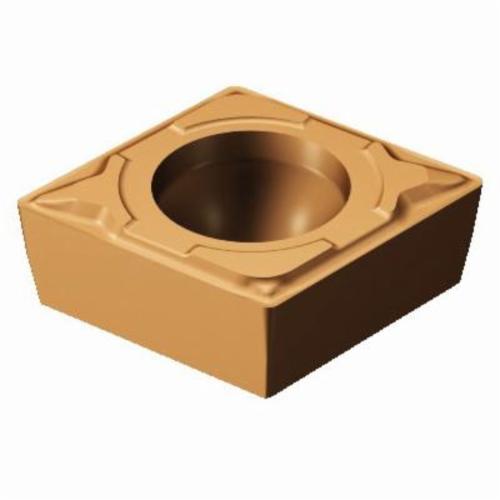Sandvik Coromant 5724970 CoroTurn® 107 Basic Shape Positive Turning Insert, CCMT 431-MF 1125, C-80 deg Diamond, 1125
CCMT Turning Inserts
1223019
MFG #: 5724970
Sandvik Coromant
20.25000
/ ea
- Alternate Catalog Number: CCMT 431-MF 1125
- ANSI Code: CCMT 431-MF 1125
- Catalog Number: 5724970
- Corner Radius: 0.0156 in
- Country of Origin: SE
- Finish: PVD Coated
- Gross Weight Per Pack: 0.0200 lb
- Hand of Insert: Neutral
- Hole Diameter: 0.2165 in
- Included Angle: 80 deg
- ISO Code: CCMT 12 04 04-MF 1125
- Item Group: 120
- Length: 0.5077 in
- Relief Angle: 7 deg LB
- Series: CoroTurn® 107
- Thickness: 0.1874 in
- Type: Basic Shape Positive
- UPC 11: 69826243390
- Width: 80 deg
- Stock Status: NONSTOCK
- Brand: Sandvik Coromant
- Manufacturer: Sandvik Coromant
- Chipbreaker: MF
- Inscribed Circle: 1/2 in
- Insert Size: 0.396 mm
- Insert Style: CCMT
- Manufacturer's Grade: 1125
- Material: Carbide
- Material Grade: M
- Maximum Depth of Cut: 2.4 mm
- Shape: C-80 deg Diamond
Sandvik Coromant Turning Insert, Basic Shape Positive, Series: CoroTurn® 107, CCMT Insert, C-80 deg Diamond, 2.4 mm Maximum Depth of Cut, 1/2 in Inscribed Circle, 0.1874 in Thickness, 0.5077 in Length, MF Chipbreaker, 0.0156 in Corner Radius, 0.2165 in Hole Dia, Manufacturer's Grade: 1125, ANSI Code: CCMT 431-MF 1125, ISO Code: CCMT 12 04 04-MF 1125, 80 deg Included Angle, 7 deg Relief Angle, Neutral Hand, Carbide, PVD Coated, Material Grade: M
- Features
| 40 - 60 deg countersunk hole and non-flat surface clamping interface |
| 1-side cutting |
| +/-0.13 mm THK and +/-0.08 mm inscribed circle tolerance |
| ER treated cutting edge |
| Solid carbide is extremely heat-resistant and used for high speed applications on cast iron, non-ferrous materials, plastics and other tough-to-machine materials |
| For external machining of small, long, slender components and internal machining |
| The positive insert shape combines low cutting forces with good edge strength |
| The screw clamping ensures stability and unobstructed chip flow |
| 0.07 - 0.27 mm/r cutting feed |
| 20 life cycle state |

